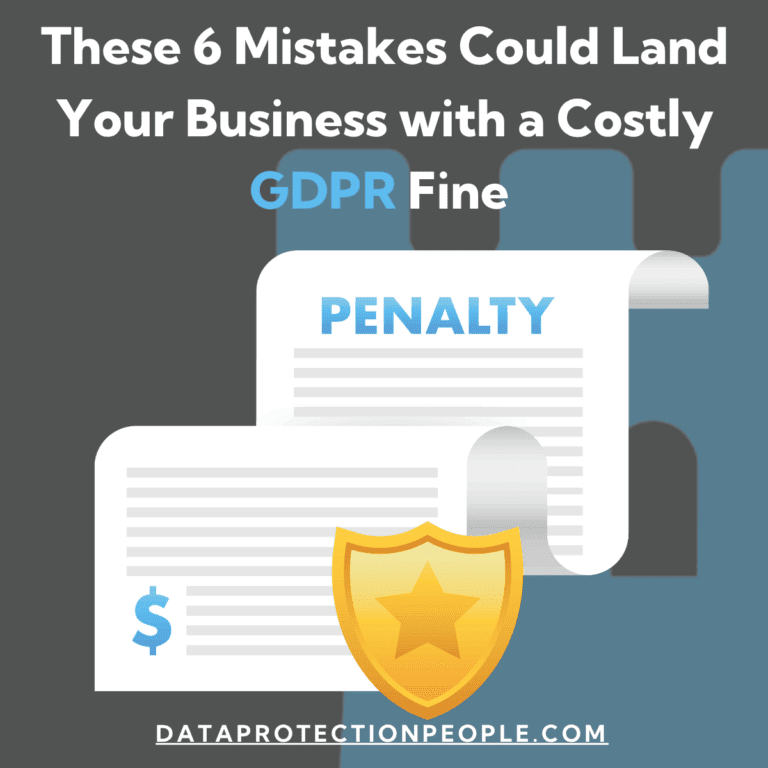These 6 Mistakes Could Land Your Business with a Costly GDPR Fine
Find out the top 6 GDPR violations and how to overcome them in our blog.

As with any form of compliance, businesses must overcome several hurdles on their path to becoming compliant with the GDPR. Through the help of our data protection consultancy, we are able to provide businesses with the insight they need to know whether they’re on the right track.
Along with simplifying compliance, our GDPR consultants are tasked with helping businesses be proactive, allowing them to mitigate risks before they unravel.
Through this work, we’ve observed six common GDPR mistakes and how to resolve them, all of which we run through in this blog.
Top 6 GDPR Violations to Watch Out for
1. You Ignored a Subject Access Request
Under the GDPR, every individual has a right to access their personal information. This right, among seven other data subject rights, must be fulfilled without undue delay.
Individuals can submit subject access requests (SARs) verbally or in writing. Since they don’t need to be addressed to a specific individual in your organisation, these requests can be sent anywhere. Without knowing what an SAR is, it’s very easy for them to be ignored and not passed to the relevant individual for follow-up.
Remember, you only have 30 calendar days to respond to a SAR. Make sure you supply the person with their requested information before time runs out.
2. You Keep Personal Data for Too Long
It’s too easy to let ‘just in case’ get in the way when erasing personal data after you no longer need it. After a while, this information will pile up, and then you’ll need to invest more resources in keeping it safe.
Rather than focusing on the what-ifs of deleting data, draw your attention to the reasons why you should erase it. If you come back empty-handed, erase the data. If the reason is valid, record it in a data retention policy so it is clear how you manage, store and delete specific types of data.
With less information stored, you won’t have to spend as much time on a subject access request. Just think – would you rather search through hundreds or thousands of files?
3. You’re Not Careful with Email
The ICO’s data security incidents trends dataset reveals that emailing data to the wrong person remains the most common mistake businesses make.
There are plenty of scenarios where this can happen. It may occur when you’re rushed off your feet between meetings or when you’re multitasking between two jobs.
All it takes is a little distraction, and you end up emailing someone with a similar name, but it’s an entirely different individual. Once that email comes through, they have access to the history of that entire email thread.
If you send bulk emails, always check that you’re using Blind Carbon Copy (BCC). Otherwise, everyone in your CC group can see each other’s email addresses.
If either of these errors happens to you, act quickly and try to recall the email as soon as possible. If it’s too late, contact the individual(s) and ask them to delete it.
4. You Don’t Prioritise GDPR Training
Data breaches most often occur within the organisation. Your employees may email data to the wrong people, fail to redact or use BCC or fall victim to the all-too-common phishing attack.
If you don’t provide them with data protection training, how can you expect them to learn? Human error isn’t enough of an excuse – it’s just negligence on your part.
The UK GDPR doesn’t state how much or what type of training your business should do. Something as simple as our ‘Introduction to Data Protection’ course will be enough to give your team a solid understanding of your GDPR obligations.
If you’re looking for convenience, our GDPR training can be delivered online or in person, so there’s no excuse not to learn. For larger organisations, you may be best placed with a data protection officer (DPO) who will handle your team’s best practices in-house.
5. Your Records Are Out of Date
GDPR compliance is all about demonstrating accountability. To do this, you need a clean audit trail, which you can evidence at a moment’s notice.
Businesses often struggle with the record-keeping aspect of GDPR. There’s a lot of paperwork involved, and if these records are out of date or insufficient, how will you know what happens when things go wrong?
This is why keeping your Record of Processing Activities (RoPA) is non-negotiable. It may take time at the start, but maintaining it means you can prove the work that’s been done to stay compliant.
If you don’t know what data is held, we recommend conducting a data mapping exercise to understand your processing activities. If you need more transparency, a detailed GDPR audit may be required.
6. You Approach Compliance Like Everyone Else
GDPR compliance cannot sustain a one-size-fits-all approach. A generic approach to data protection often falls short because it doesn’t consider your business’s specific nuances. This ‘one-size-fits-all’ mentality creates vulnerabilities, leaving room for costly mistakes.
A data protection by design and by default approach means your business integrates data protection into everything it does. Rather than assuming the best, this concept ensures privacy and security are built into your processes from the ground up, protecting individual rights proactively.
If you want a tailored approach, our GDPR consultants can help identify gaps in your data protection framework and recommend ways to improve compliance.
Speak to Our Team for Expert GDPR Support
Don’t let these common GDPR mistakes expose your business to costly fines. Our expert data protection consultants provide the tailored insights and measures you need to secure your data and achieve compliance.
